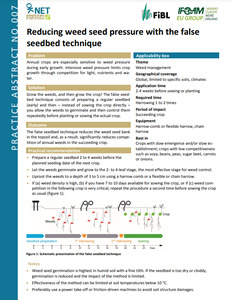{Tool} Reducing weed seed pressure with the false seedbed technique (OK-Net Arable Practice Abstract). [Reduzieren des Unkrautdrucks mit der Falschen-Saatbettbereitung.] Creator(s): Dierauer, Hansueli; Conder, Malgorzarta and Weidmann, Gilles. Issuing Organisation(s): FiBL - Research Institute of Organic Agriculture. OK-Net Arable Practice Abstract, no. 007. (2017)
Preview |
PDF
- German/Deutsch
(Reduzieren des Unkrautdrucks mit der falschen Saatbettbereitung)
320kB |
Preview |
PDF
- English
(Reducing weed seed pressure with the false seedbed technique)
320kB |
![[thumbnail of 2023-01-09 14_32_41-Reducing weed seed pressure with the false seedbed technique.png]](/31022/31.hassmallThumbnailVersion/2023-01-09%2014_32_41-Reducing%20weed%20seed%20pressure%20with%20the%20false%20seedbed%20technique.png)  Preview |
Image (PNG)
- Cover Image
- English
119kB |
Document available online at: http://Orgprints.org/31022
Summary in the original language of the document
The false seedbed technique reduces the weed seed bank in the topsoil and, as a result, significantly reduces competition of annual weeds in the succeeding crop.
• Prepare a regular seedbed 2 to 4 weeks before the planned seeding date of the next crop.
• Let the weeds germinate and grow to the 2- to 4-leaf stage, the most effective stage for weed control.
• Uproot the weeds to a depth of 3 to 5 cm using a harrow comb or a flexible or chain harrow.
• If (a) weed density is high, (b) if you have 7 to 10 days available for sowing the crop, or if (c) weed competition in the following crop is very critical, repeat the procedure a second time before sowing the crop as usual.
Notes
• Weed seed germination is highest in humid soil with a fine tilth. If the seedbed is too dry or cloddy, germination is reduced and the impact of the method is limited.
• Effectiveness of the method can be limited at soil temperatures below 10 °C.
• Preferably use a power take-off or friction-driven machines to avoid soil structure damages.
Summary translation
Die falsche Saatbettbereitung reduziert den Samenvorrat an einjähriger Unkräuter im Oberboden und, als Folge davon, den Konkurrenzdruck in der Folgekultur.
• 2-4 Wochen vor dem geplanten Saattermin der nächsten Kultur ein gleichmässiges Saatbett herrichten.
• Das Unkraut bis zum 2- bis 4-Blattstadium wachsen lassen (wirksamstes Stadium zur Regulierung).
• Das Unkraut mit dem Striegel oder einer Egge in einer Tiefe von 3-5 cm entwurzeln.
• Bei (a) hoher Unkrautdichte, (b) einer Zeitreserve von 7-10 Tagen oder (c) einer besonders unkrautempfindlichen nächsten Kultur das Vorgehen wiederholen.
Hinweis
• Die Unkrautsamen keimen am besten in feuchtem Boden mit einer feinen Krume. In einem trockenen oder zu groben Saatbett sind die Keimungsrate und die Wirkung der Methode entsprechend gering.
• Auch tiefe Bodentemperaturen unter 10 °C reduzieren den Erfolg der Massnahme.
• Auf zapfwellengetriebene Geräte sollte möglichst verzichtet werden, um Schäden an der Bodenstruktur zu vermeiden.
| EPrint Type: | Practice tool |
|---|---|
| What problem does the tool address?: | Annual crops are especially sensitive to weed pressure during early growth. Intensive weed pressure limits crop growth through competition for light, nutrients and water. |
| What solution does the tool offer?: | Grow the weeds, and then grow the crop! The false seedbed tech-nique consists of preparing a regular seedbed (early) and then – in-stead of sowing the crop directly – you allow the weeds to germinate and then control them repeatedly before planting or sowing the ac-tual crop. |
| Country: | Switzerland |
| Type of Practice Tool: | Practice abstracts |
| Theme: | Weed management |
| Keywords: | weed management |
| Keywords: | weed management, arable farming |
| Agrovoc keywords: | Language Value URI English arable farming http://aims.fao.org/aos/agrovoc/c_36528 English weed control http://aims.fao.org/aos/agrovoc/c_8345 |
| Subjects: | Crop husbandry > Weed management |
| Research affiliation: | European Union > Horizon 2020 > OK-Net Arable > OK-Net-Arable Tools Switzerland > FiBL - Research Institute of Organic Agriculture Switzerland > Knowledge exchange > Advice European Union > Horizon 2020 > OK-Net Arable European Union > Organic Farm Knowledge |
| Horizon Europe or H2020 Grant Agreement Number: | 652654 |
| Related Links: | https://organic-farmknowledge.org/tool/31022 |
| Project ID: | ofk |
| Deposited By: | Forschungsinstitut für biologischen Landbau, FiBL |
| ID Code: | 31022 |
| Deposited On: | 16 Jan 2017 15:05 |
| Last Modified: | 02 May 2024 10:31 |
| Document Language: | English, German/Deutsch |
| Status: | Published |
Repository Staff Only: item control page

 Download Statistics
Download Statistics Download Statistics
Download Statistics
